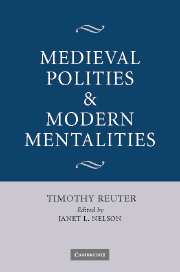Book contents
- Frontmatter
- Contents
- Editor's note
- Acknowledgements
- List of abbreviations
- Editor's introduction
- PART I MODERN MENTALITIES: HISTORIOGRAPHIES, METHODOLOGIES, PRECONCEPTIONS
- PART II THE SYMBOLIC LANGUAGE OF MEDIEVAL POLITICAL ACTION
- PART III POLITICAL STRUCTURES AND INTENTIONS
- 11 Assembly politics in western Europe from the eighth century to the twelfth
- 12 Sex, lies and oath-helpers: the trial of Queen Uota
- 13 Plunder and tribute in the Carolingian empire
- 14 The end of Carolingian military expansion
- 15 The Ottonians and Carolingian tradition
- 16 The making of England and Germany, 850–1050: points of comparison and difference
- 17 King, nobles, others: ‘base’ and ‘superstructure’ in the Ottonian period
- 18 The ‘imperial church system’ of the Ottonian and Salian rulers: a reconsideration
- 19 Peace-breaking, feud, rebellion, resistance: violence and peace in the politics of the Salian era
- 20 The medieval German Sonderweg? The empire and its rulers in the high Middle Ages
- 21 Mandate, privilege, court judgement: techniques of rulership in the age of Frederick Barbarossa
- 22 All quiet except on the Western Front? The emergence of pre-modern forms of statehood in the central Middle Ages
- Index
12 - Sex, lies and oath-helpers: the trial of Queen Uota
Published online by Cambridge University Press: 12 August 2009
- Frontmatter
- Contents
- Editor's note
- Acknowledgements
- List of abbreviations
- Editor's introduction
- PART I MODERN MENTALITIES: HISTORIOGRAPHIES, METHODOLOGIES, PRECONCEPTIONS
- PART II THE SYMBOLIC LANGUAGE OF MEDIEVAL POLITICAL ACTION
- PART III POLITICAL STRUCTURES AND INTENTIONS
- 11 Assembly politics in western Europe from the eighth century to the twelfth
- 12 Sex, lies and oath-helpers: the trial of Queen Uota
- 13 Plunder and tribute in the Carolingian empire
- 14 The end of Carolingian military expansion
- 15 The Ottonians and Carolingian tradition
- 16 The making of England and Germany, 850–1050: points of comparison and difference
- 17 King, nobles, others: ‘base’ and ‘superstructure’ in the Ottonian period
- 18 The ‘imperial church system’ of the Ottonian and Salian rulers: a reconsideration
- 19 Peace-breaking, feud, rebellion, resistance: violence and peace in the politics of the Salian era
- 20 The medieval German Sonderweg? The empire and its rulers in the high Middle Ages
- 21 Mandate, privilege, court judgement: techniques of rulership in the age of Frederick Barbarossa
- 22 All quiet except on the Western Front? The emergence of pre-modern forms of statehood in the central Middle Ages
- Index
Summary
The Regensburg Continuator of the so-called Annals of Fulda reported the following episode in the year 899:
Then a scandal, and worse, a crime, unheard of for many years, was published about Queen Uota: that she had yielded her body to a lustful and wicked union. She cleared herself of the accusation at Regensburg in the month of June with seventy-two oath-helpers before the judgement of the leading men who were present.
This annalistic entry provides all we directly know about this case. It is true that Hermann of Reichenau gives a report of the same event:
Queen Uota, accused of the crime of adultery with certain men, was absolved at an assembly at Regensburg by the oath-givings of seventy-two princes.
But since Hermann or his source(s) demonstrably used the Annals of Fulda, we have to infer that we are not dealing here with an independent testimony, and that Hermann knew no more than we do. In particular, the information that the oath was taken by seventy-two ‘princes’ (principes) should be read as Hermann's ‘cultural translation’ into the terms of his own time, something found elsewhere in his Chronicle entries relating to the later ninth and early tenth centuries.
What we know about this episode is therefore very limited.
- Type
- Chapter
- Information
- Medieval Polities and Modern Mentalities , pp. 217 - 230Publisher: Cambridge University PressPrint publication year: 2006

